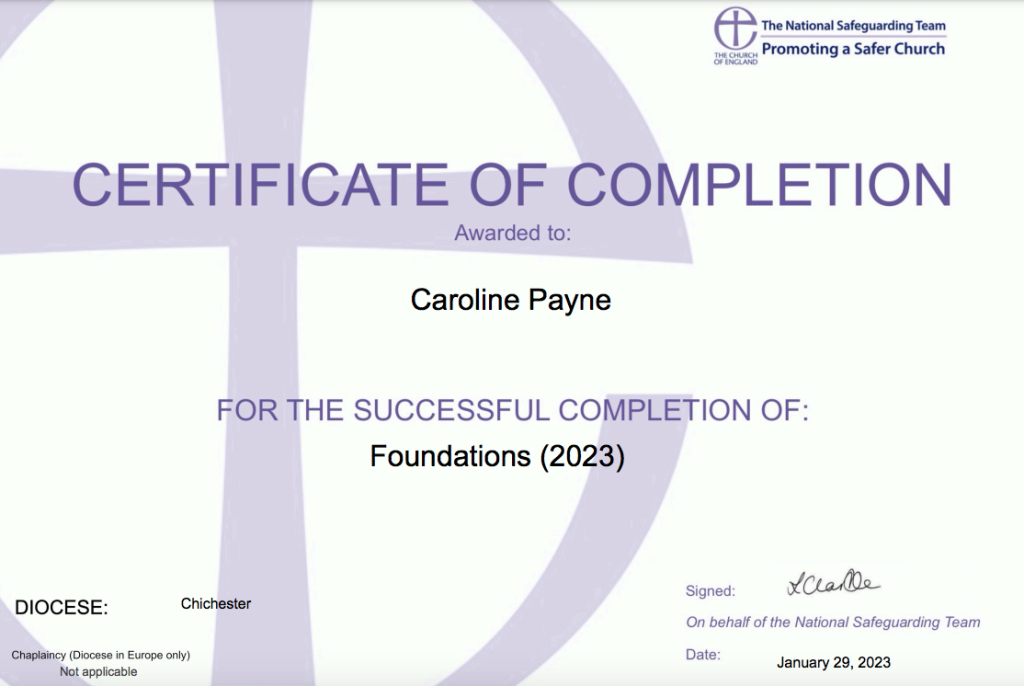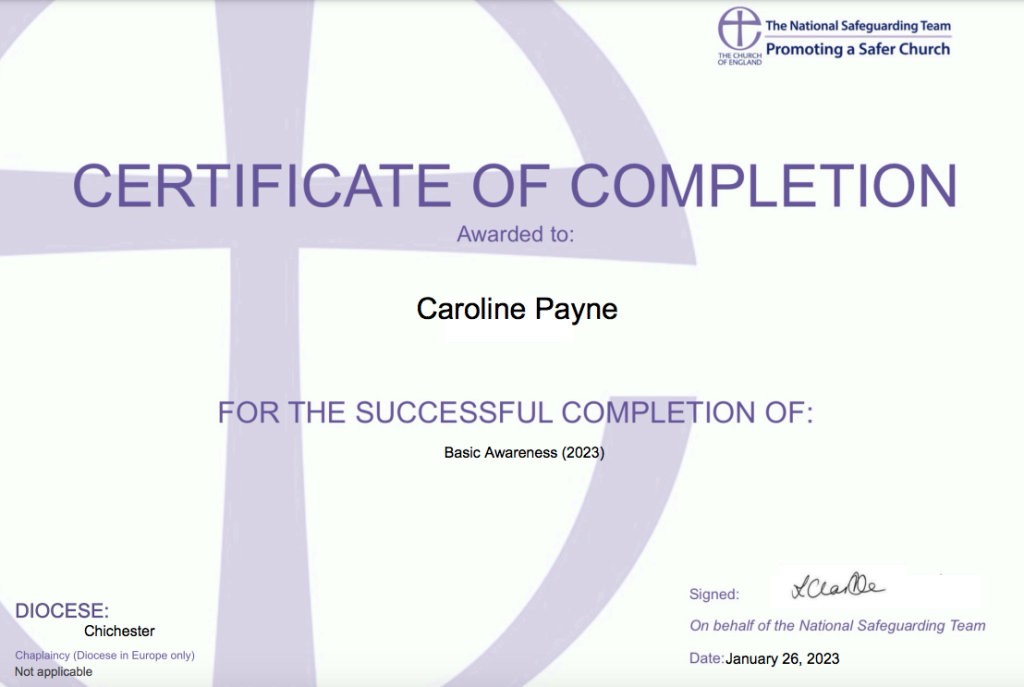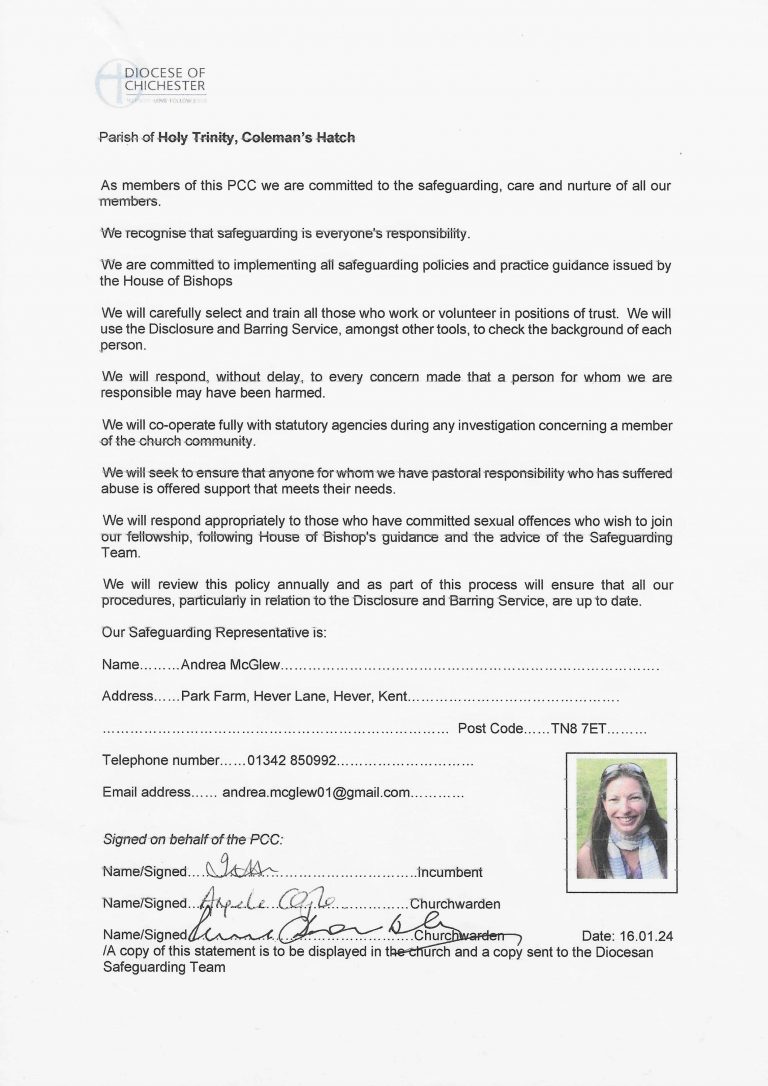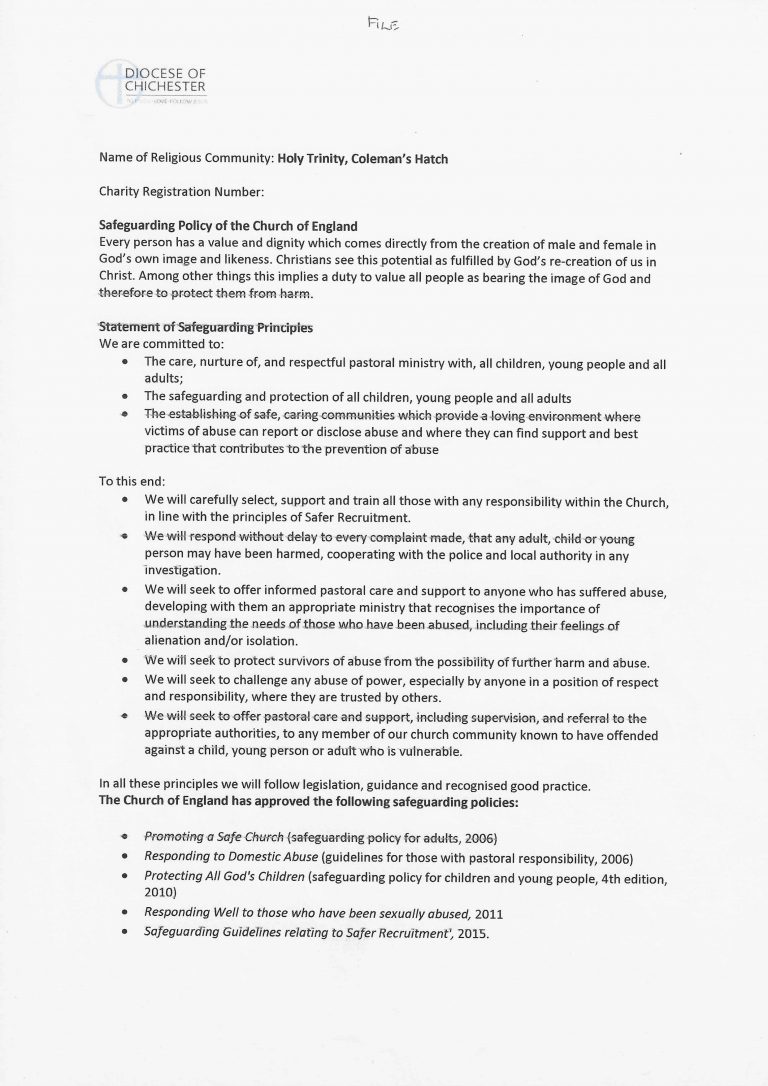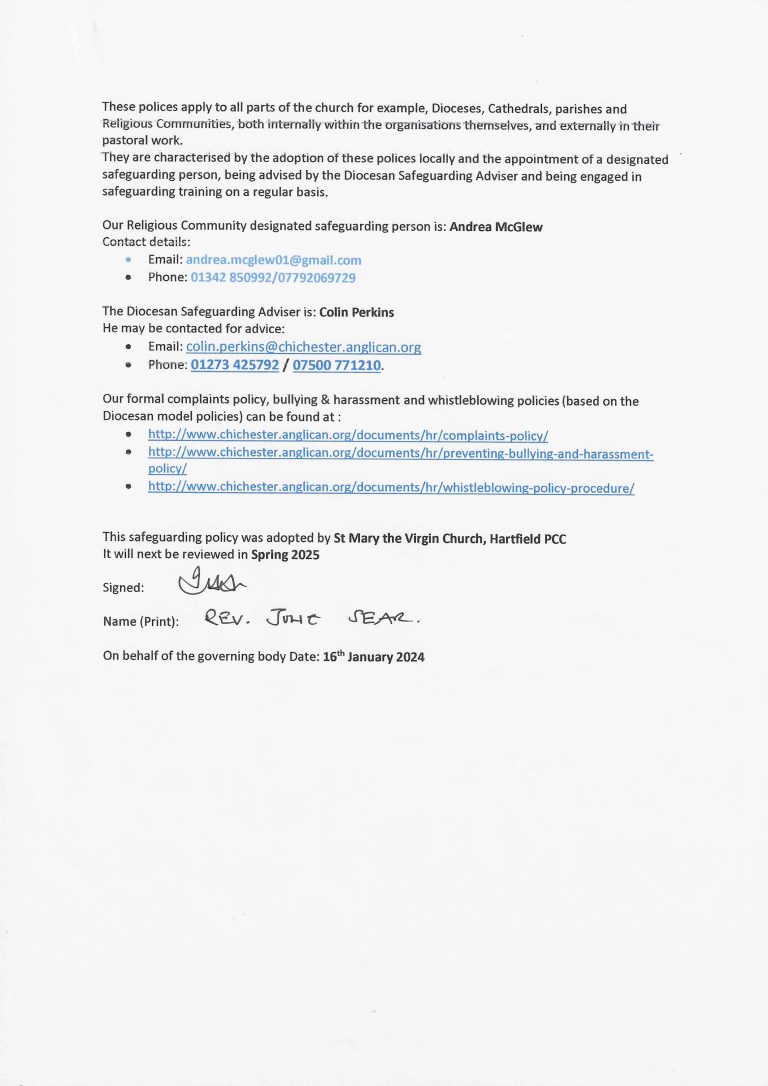Safeguarding at Church
“The parish of Coleman’s Hatch: Holy Trinity is committed to the safeguarding of children, young people and adults. We follow the House of Bishops guidance and policies and have our own Parish Safeguarding Officer(s), PSOs. The Diocese of Chichester’s safeguarding pages contain vital links and information including contacts for the Diocesan Safeguarding Advisor (DSA) who advise our PSOs. If you are concerned that a child or adult has been harmed or may be at risk of harm please contact the DSA. If you have immediate concerns about the safety of someone, please contact the police and your local authority Children or Adults Services.”
Safeguarding Policy
Behaviour Code for Adults Working with Children
This Code outlines the expectations of the Parish of Holy Trinity, Coleman’s Hatch, for all those who work or volunteer with children. It reflects our desire to follow Jesus in all we do, reflecting his love to those we minister to. It follows from our determination to ensure that our church is a place where children can not only be safe, but feel safe. And, it reflects our unwavering commitment to the highest possible standards of safeguarding practice.
Following this code will help to protect children from abuse and inappropriate behaviour from adults. It will help them learn how safe adults behave around them – thus equipping them to better recognise if an adult is behaving unsafely around them, and to know that this behaviour is wrong. It will also help staff and volunteers maintain the standards of behaviour expected of them, and will reduce the possibility of unfounded allegations of abuse being made against them.
Upholding the Code
All members of staff and volunteers are expected to report any breaches of this code to the safeguarding officer, Andrea McGlew, under the parish whistle-blowing procedure, or, if necessary, under the parish safeguarding policy.
Staff and volunteers who breach this code of behaviour may be subject to disciplinary procedures or asked to leave their role. Serious breaches may also result in a referral being made to a statutory agency such as the police of the local authority children’s social care department.
Responsibility of Staff and Volunteers
When working with children and young people for the Parish of Holy Trinity, Coleman’s Hatch, all staff and volunteers are acting in a position of trust. it is important that all staff and volunteers are aware that they may be seen as role models by children and young people, and by their parents. They therefore must act in an appropriate manner at all times.
When working with children and young people, it is important to:
- Treat all children and young people with respect and dignity.
- Ensure that your own language, tone of voice and body language is respectful.
- Value the contribution of children and young people, and take their views seriously, actively involving them in planning activities wherever possible.
- Respect a young person’s right to personal privacy.
- Always aim to work within sight of another adult.
- Ensure another adult is informed if a child needs to be taken to the toilet; toilet breaks should be organised for young children.
- Ensure that children and young people know who they can talk to if they need to speak to someone about a personal concern.
- Respond warmly to a child who needs comforting, but make sure there are other adults around.
- If any activity requires physical contact, ensure that the child and parents are aware of this and it’s nature beforehand.
- Administer any necessary First Aid with others around, in the absence of a trained first aider.
- Obtain consent for any photographs/videos to be taken, shown or displayed.
- Record any concerning incidents and give the information to your group leader. Sign and date the record.
- Always share concerns about a children or the behaviour of another worker within your group leader and/or the parish safeguarding coordinator.
- If volunteering on a regular basis attend relevant/appropriate safeguarding training.
When working with children and young people, you should not:
- Initiate physical contact. Any necessary contact (e.g. For comfort, see above) should be initiated by the child.
- Play rough physical games with children, or allow games with a potentially physical element (such as ‘British Bulldog’) to be played between children without careful thought, planning, and prior notification to parents and children.
- Act, speak, or conduct yourself in a sexually provocative or suggestive way, either directly towards children, or with other adults when you are with children, or engage in any sexual behaviour at all with children or young people. It is your responsibility to do everything you can do to avoid any hint of sexually inappropriate behaviour, language, or styles of relating with children or young people.
- Encourage children to behave in sexually provocative or suggestive ways with each other.
- Touch a child inappropriately or obtrusively.
- Invade a child’s privacy while washing or going to the toilet.
- Act in a way that can be perceived as threatening or intrusive.
- Use any form of physical punishment.
- Scapegoat, ridicule or reject a child, group or adult.
- Permit abuse peer activities, e.g. Initiation ceremonies, ridiculing or bullying.
- Show favouritism to any one child or group.
- Allow a child or young person to involve you in excessive attention seeking, including that which is overtly physical or sexual in nature. It is always your responsibility to maintain appropriate boundaries in your work with children and young people.
- Give lifts to children or young people on their own or on your own.
- Smoke tobacco in the presence of children.
- Drink alcohol when responsible for young children, or offer to give or buy them alcohol.
- Share sleeping accommodation with children.
- Invite a child to your home alone.
- Arrange social occasions with children (other than family members or close family friends) outside organised group occasions.
- Allow unknown adults access to children. Visitors should always be accompanied by a known person.
- Allow strangers to give children lifts.
Andrea McGlew
Safeguarding Officer
Our Religious Community designated safeguarding person is: Andrea McGlew
Email: andrea.mcglew01@gmail.com
Phone: 01342 850992/07792069729
If you are a child and you need to talk to someone about things that are happening to you that you don’t like, please click on this link which takes you the Childline website, or telephone Childline on 0800 1111 – https://www.childline.org.uk/
* If you are an adult and you need to access support about something that is happening to you, please click on this link to find out how you can do that. Scroll down to find links to various support organisations for you to contact. https://safeguarding.chichester.anglican.org/Ihavebeenabused/
* If you need to contact the Diocesan Safeguarding Team, please click on this link. https://safeguarding.chichester.anglican.org/contacttheteam/
* If you need to report a safeguarding concern to the statutory authorities in Sussex, please click on this link, click on the option on the left that most describes the situation you are concerned about, and follow the advice and further links you find there. Please remember to contact the Diocesan Safeguarding Team as well once you have contacted the statutory authorities. https://safeguarding.chichester.anglican.org/whatdoidoif/
